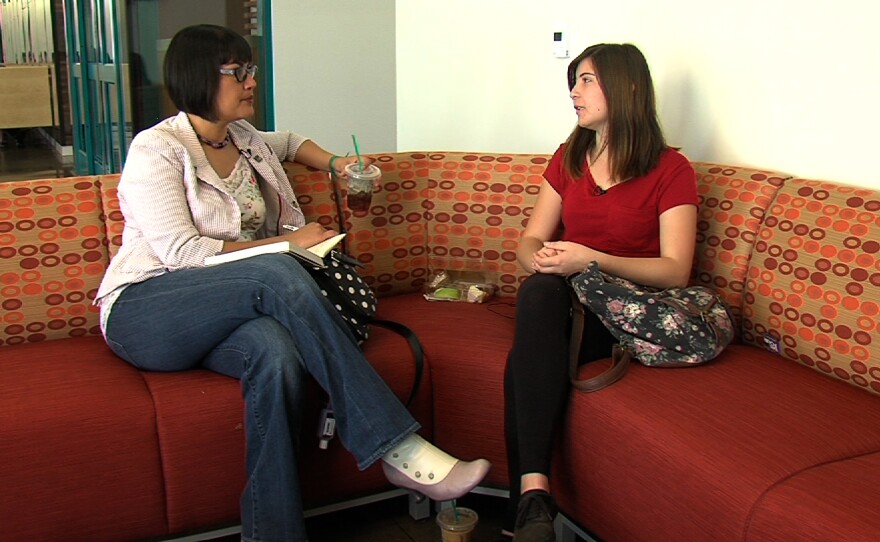Freshman Hannah Medina sits in San Diego State University's noisy student union, sipping coffee with her college coach Marisela Chevez.
"I'm already working on my paper," Medina tells Chevez.
"How long will it be?" Chevez asks.
"Four to five pages," Medina says.
"Oh that's not bad," Chevez responds.
Their conversation jumps rapidly from financial aid forms to homework to exercise habits to boyfriends.
"How's stuff with the boyfriend?" Chevez asks.
Medina blushes and smiles.
"Good," she says. "He's a sweet guy."
Chevez is acting like a guidance counselor, but she doesn't work for SDSU. She's a college coach hired by the nonprofit Juma Ventures to work with first-generation college students. Students like Medina started Juma as high school sophomores and applied for college with the program's guidance.
But when Medina was accepted into college, Juma didn't bail on her. Instead, Medina will stay in the program all the way until she graduates, meeting every month with Chevez.
These coaching sessions aim to fill an unmet need for first-generation college students.
While about one third of students are the first in their families to go to college, just 15 percent are able to graduate in under six years, according to the U.S. Department of Education.
These students can struggle with everything from being underprepared for college classes to confusing financial aid forms to living away from home. That's where Chevez comes in.
"Sometimes I'm an academic coach, some days I'm a cheerleader, some days I'm a shoulder to cry on, sometimes I'm that annoying little voice in their head that keeps pushing them to do more," Chevez said.
Juma is a grant and donation-funded nonprofit that also provides students with part-time jobs to save money for college. Students don't pay to be in the program. In 2011, the nonprofit, which has offices in five other cities besides San Diego, took in about $2.8 million in contributions and grants and worked with about 360 students.
Very few programs in the country transition with students from high school through college as Juma does, said Christopher Newman, an assistant professor who studies higher education at University of San Diego.
Newman said first-generation college students struggle not only with a new college experience, but with balancing expectations of their families.
"Their family may not understand the role that they have as college students," Newman said. "They'll say, 'why are you absent at the family functions?' 'Well, I'm studying for a test.' They may not understands all those things."
Medina was an honors student at Madison High School in Clairemont, but her grades fell during her first semester at SDSU. She's now learning from Chevez about how to study for college classes and use resources on campus.
"Recently I learned math really isn't my strong suit, and I was worried I wouldn't be able to fulfill the requirement. So I reached out to (Chevez) and told her I was struggling," Medina said. "She told me, make sure you go to your counselors at school, go to the tutoring center and get any extra help that I do need."
Medina said unlike many of her classmates, she can't turn to her parents for advice on how to handle college classes.
"If my mom or dad went to college, I'd probably be able to talk with them about what they did in order to overcome challenges, and it'd probably be more beneficial to me because it'd be on a personal level," Medina said.
Brittany Russell, Juma's director, said the idea is to give these students equal footing.
"If you have been to college and you know that, 'wow, my parents really did push me to do it and it was expected,'" she said. "Or if you had those times of darkness or thinking you couldn't do it, you did have that person to call, and that person guided and supported you."

With Chevez's help, Medina is staying on track in her classes and taking summer school to make sure she graduates in four years. During her check-in meeting, she gets gentle nudging about budgeting her money and taking care of herself.
"Have you been working out, exercising, having fun?" Chevez asks.
Medina sighs heavily.
"With this heat, I cannot work out," she says.
"Swimming!" Chevez says with a smile.
Chevez works with 24 other college freshman besides Medina who attend colleges across the state. For students in schools out of town, Chevez holds Skype meetings, phone check-ins, or trades text messages. Medina's cohort is the first from Juma to start college, so next year Chevez will have another 30 freshmen to track along with Medina and the other 24 students.
It can be frustrating when students occasionally distance themselves or don't act on her advice, Chevez said.
"Because they are teenagers, they're going to make their own choices," she said. "I can't expect them to know everything and have to remind myself to step back and let them make their own mistakes and be there when they need the help."
Medina said Chevez's light touch helps her become an adult who won't rely on her coach for everything.
"She's not pointing down to me, saying, 'this is what you need to do, this is how you're going to do it,' " Medina said. "She's giving me these resources in order for me to do it on my own."
That is something a parent would do: slowly pull back as kids learn to navigate college on their own.
Medina plans to graduate in three years and wants to become a social worker. She says she'd love to work for Juma herself some day.






